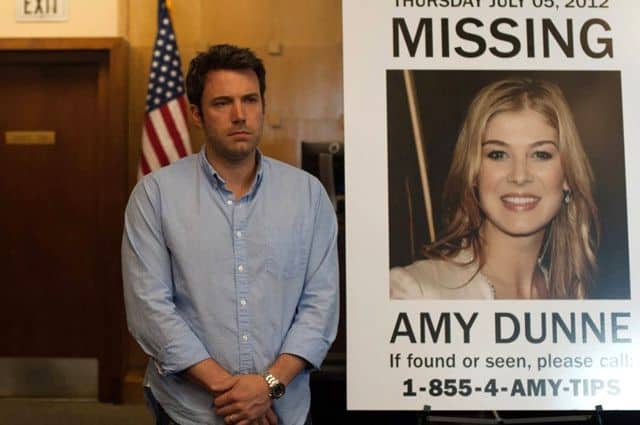Deadly obsessions take charge in adaptations of ‘Gone Girl’ and ‘Sharp Objects.’
“You love dead girls,” a dangerously alive girl says to her sister in an upcoming episode of Sharp Objects, the latest adaptation of a book by the author of best-selling mysteries Gone Girl and Dark Places. And there it is, the nexus of writer Gillian Flynn’s dark-hearted works laid plain in one line: girls, death, love. Except in the worlds Flynn creates, shadowy landscapes traversed by wary bones and unsound minds, it is not really love that we see, but preoccupation, fixation, obsession–all its warped and perverse relatives.
The women in Flynn’s works protect their hardwired obsessions, tending to them like mothers to children. In HBO’s trippily designed miniseries Sharp Objects, fixation settles around the town of Wind Gap, Missouri like a fine dust, unavoidable and deeply atmospheric. For the Preaker family–mother Adora (Patricia Clarkson) and daughters Camille (Amy Adams) and Amma (Eliza Scanlen)–everything from a dollhouse to a razor blade to a long-empty bedroom becomes a point of preoccupation, a worry stone ground down from overuse. Dark Places, adapted underwhelmingly for A24 in 2015, also features a series of obsessions, none more subtle or important than triple murder survivor Libby Day’s (Charlize Theron) obsession with blocking out her own past. Finally and most memorably, Gone Girl’s Amy Dunne (Rosamund Pike) is an amalgam of brutal histrionics and perfectionistic tendencies, the fruits of her obsessive labor a dose of icy venom delivered–in a stunning six-minute monologue mid-way through the film–with enough force to make your teeth rattle.
The women in Flynn’s works have destructive, propulsive bitterness in common as well, an overpowering feeling of having been wronged that fuels their individual fixations. The three actresses chosen as the faces of Flynn’s anti-heroines couldn’t be more different; while Charlize Theron was in her comfort zone as a complex, angry woman, Amy Adams plays against type as a potential trainwreck in Sharp Objects. Meanwhile, for most viewers, Rosamund Pike was a clean slate pre-Gone Girl, a choice that was apparently intentional.

No casting choice works better than the other (it’s the dull pacing and strange stylistic choices that make Dark Places a bit of a dud, not the all-star cast), but Amy Adams has the benefit of a longer-form story that gives her room to tussle with an enigmatic character who comes in and out of focus thanks to Flynn (who also adapts some of her works) and her disorientingly cyclical storytelling. Like all of Flynn’s central women, journalist Camille has a sensationalized small-town image that’s larger-than-life in comparison to her personal, slow-growing brokenness. She wears long sleeves, jeans, and yesterday’s makeup like armor, scaring off the locals even as she piques their lurid curiosity.
The central question in each of these stories isn’t so much who did it, but why? Judging by her books and the two stories we’ve seen through on screen, the answer is always that the person who is responsible needed validation in ways which were neither sustainable nor healthy. Like the hardscrabble protagonists, the culprits behind the crimes committed in Flynn’s stories defy easy categorization. They get power however they can snag it, whether that means money or attention or blind love–or the violent means by which they take each of these things. As told by Flynn (and David Fincher, Marti Noxon, and more) the motivations for crimes are deceptively simple. They’re both resoundingly common and layered with microscopic intricacies, like the blood beating through a human heart.
Each adaptation of Gillian Flynn’s works has another thing in common: the sticky midwest heat of a loathed but inevitable hometown visit. Directed with a wildly different eye by David Fincher, Gilles Paquet-Brenner, and Jean-Marc Vallée in turn, the thorny landscapes of Kansas and Missouri become as sinister to the viewers as they are for the women who would rather be anywhere else. In Sharp Objects, Vallée frames Missouri (actually shot in Georgia) as a winding maze of tree-lined roads, all of which seem to lead to the local dive bar or 24-hour convenience store. Additionally, the townsfolk appear to be a bunch of nobodies, former classmates of Camille’s who became ensnared by marriages and jobs and addictions. Southern Gothics in their own right, these creeping adaptations each tell the story of places where nothing seemingly ever happens–until it does.

The heavy, expectant atmosphere of the region Amy Dunne calls “the navel of this great country” is in each instance made increasingly tense by a grotesque mix of tragedy and fame. Headline-chasers, true crime fetishists, and Nancy Grace types populate these places, and they may be the key to understanding the powerful current of cynicism that runs through Flynn’s works. These people–a chorus of small-town gossips who are ignorant at best, dangerously gutless bystanders at worst–are reminiscent of wilting Tennessee Williams characters, too in love with the glamour of tragedy to be of help to anyone. They’re also uncomfortably familiar to anyone who has ventured into the online comments sections of violent news stories. It’s the emotional disconnect, then, the glazed-over American obsession with armchair trial by public opinion, which makes the worlds Flynn writes so harrowing. The killers might be bad, these stories say tauntingly, but don’t you just love watching them?
“You love dead girls,” Amma tells Camille knowingly in Sharp Objects, and she’s right. She says it in a whisper, but she may as well be speaking to us, too.
The post Gillian Flynn’s Dark America appeared first on Film School Rejects.
0 comments:
Post a Comment